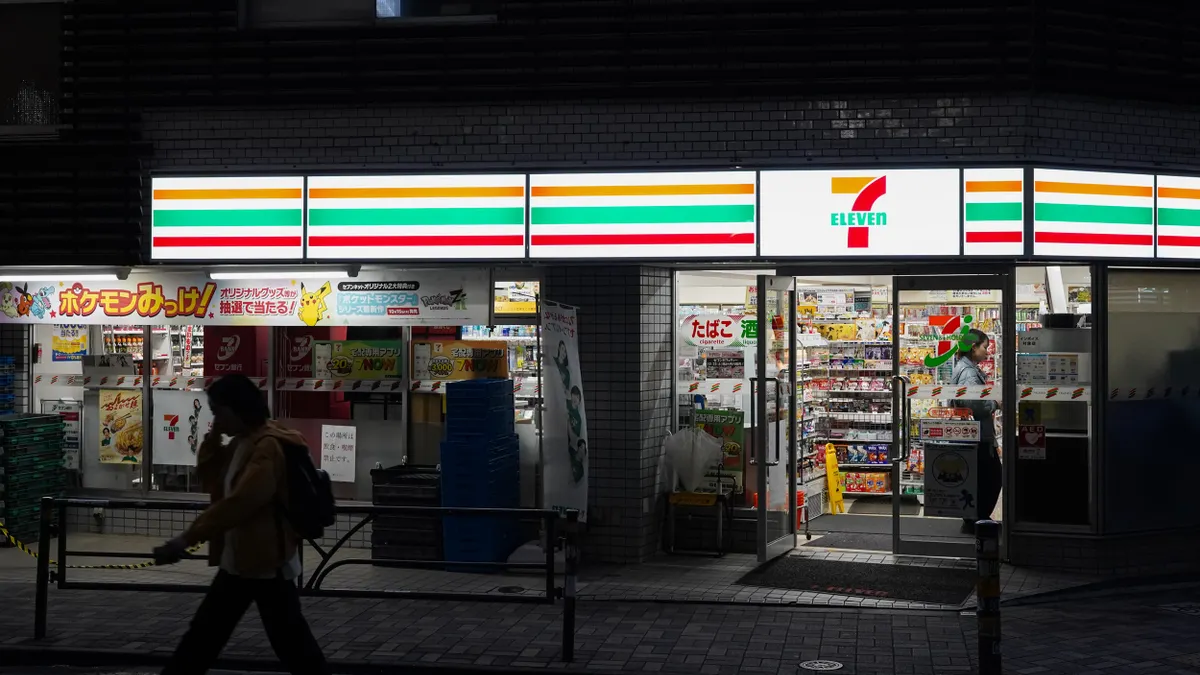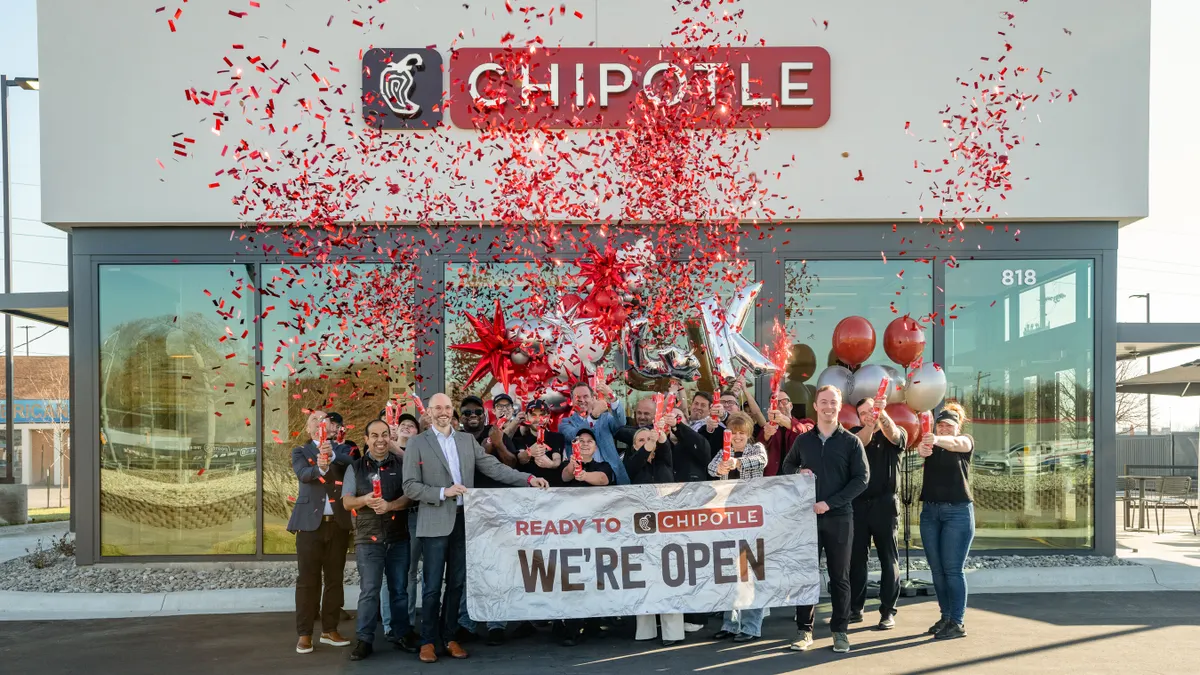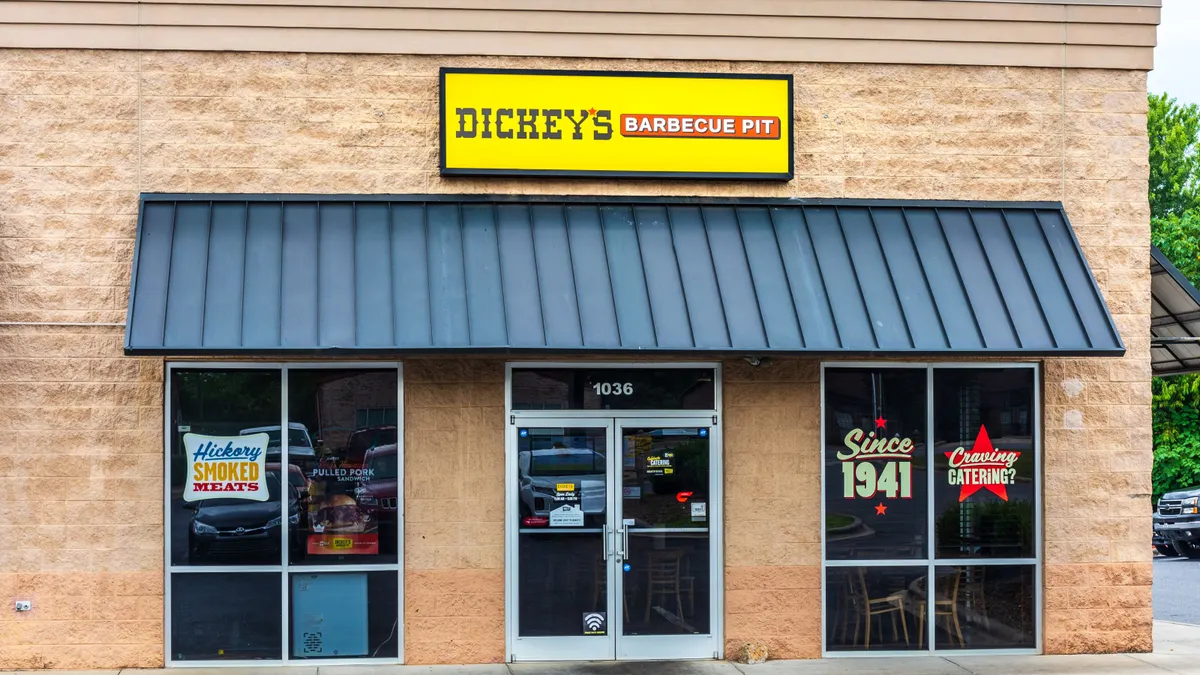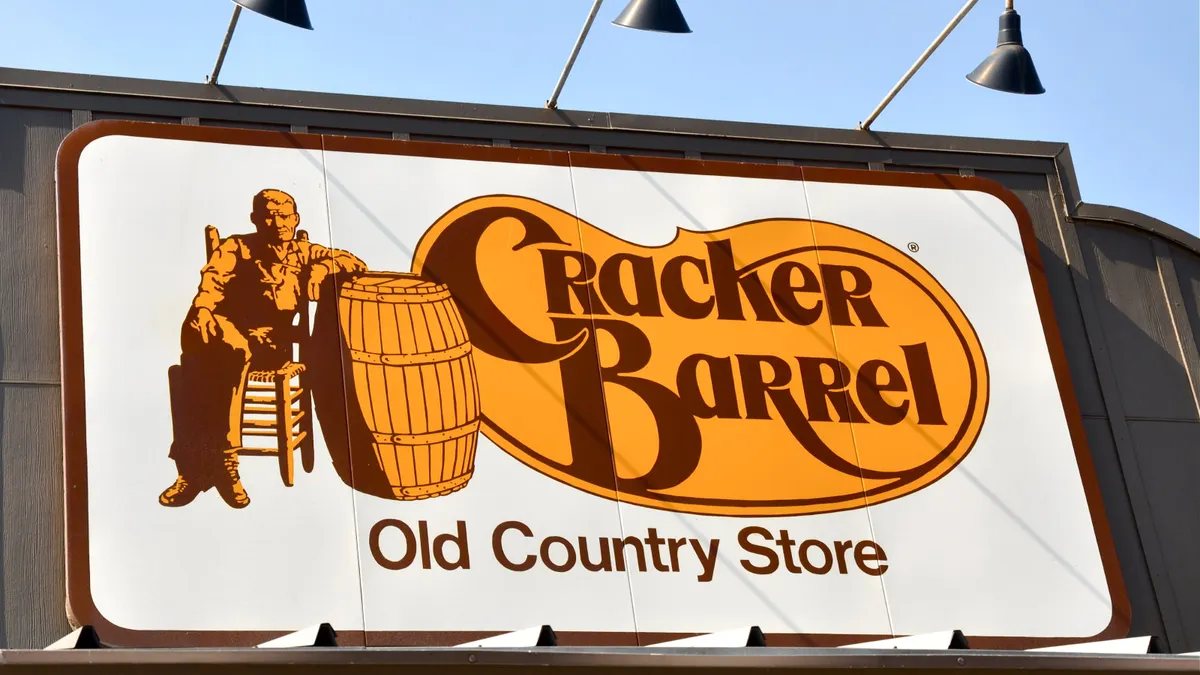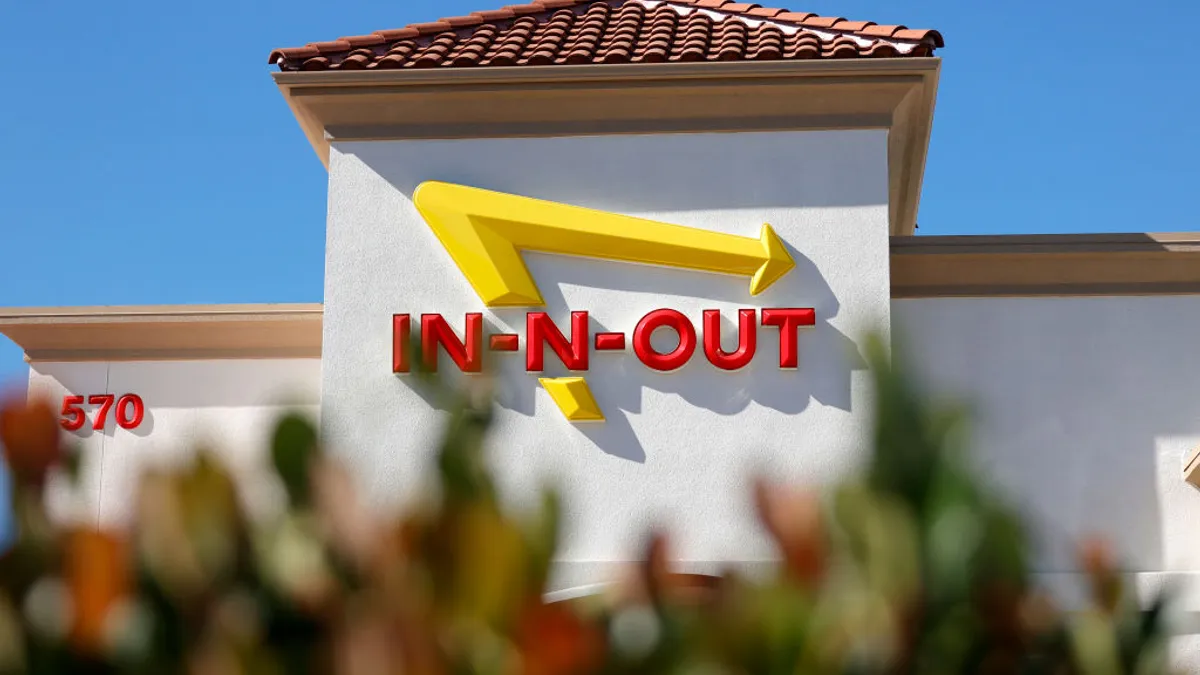When Chicken Salad Chick CEO Scott Deviney was introduced to the brand by a friend, he thought it was just a little sandwich shop that wouldn't make it. But when he and his wife ate at one of its Atlanta locations, he was impressed by the quality of the fresh food, the quirkiness of the decor, the friendliness of the staff and the model that epitomizes Southern charm.
"Without knowing it, they were very on trend with made-from-scratch [food] in each restaurant every day, female-centric, very warm and inviting and great service," he told Restaurant Dive.
One of the most unique aspects of the brand, he noted, is where the names for each chicken salad flavor comes from. The chain named each variety after a person the founders knew, which added a human element to the chain.
"There's a great connection with our guests that really drives them to this brand," Deviney said.
While eating their first Chicken Salad Chick sandwiches, he and his wife concluded this was a brand that could be scaled.
"As long as you are really focused on the culture, you could really build this brand out to something neat," he said.
Chicken Salad Chick founders Stacy and Kevin Brown didn't have restaurant experience prior to opening their first restaurant in 2008, but Deviney, who owned several franchised restaurants for six years before he sold them to a large franchise group in 2014, knew a thing or two about how to build a successful restaurant brand. He also had a background in banking that includes work in the food and beverage space
That same year he met the founders, they started to hash out a plan to partner with Eagle Merchant Partners with Deviney as CEO of the restaurant. The deal was finalized in May 2015, the same time that Deviney started as CEO. By the end of 2016, it surpassed $45 million in sales and scaled to 63 units, according to Restaurant Business. While its sales were under $200 million in 2018, it grew sales by 44% that year, according to Technomic data shared during the National Restaurant Association Show in May.
Restaurant Dive spoke with Deviney to learn more about how this little sandwich shop is growing into a multi-unit fast casual restaurant eyeing 400 units within the next five years.
Questions and answers have been edited for clarity and brevity.
RESTAURANT DIVE: Why are we seeing so much growth from Chicken Salad Chick?
SCOTT DEVINEY: The growth that's happening now was really started four years ago. I took over May 2015 and immediately started hiring some functional leaders in each department. There was a VP of operations that was already here, Jim Thompson, who's still here and he's great, but he was the only executive.
Part of the success model is knowing that you need a great group of people to help build the business for the long run. And it's very expensive. You have to be willing to commit dollars to people and resources in terms of systems, to be able to take this model and replicate it over and over again at the same service level. We're giving our franchisees the same service that we're asking them to give our guests — they're our customers to a point.
We are developing about 20% of the stores each year ourselves, so we need a development team who can develop company stores as well as help franchise owners. And we need an operations team to help run the company stores that we're going to have. So really what we're doing now, which is opening about 45 restaurants this year — much of that work went into building the team and building the pipeline so that as projects came up, we were able to take advantage of them.
What is Chicken Salad Chick doing differently that has allowed it to reach 100-plus and you're still thriving?
Deviney: I think you have to be very disciplined in putting together your strategic plan and your goals. One of the things that we do is we don't jump states. We try to be very methodical with growing in concentric circles. So at the end of this year, we'll be in 16 states, but you wouldn't find us in Arizona, for example, because we haven't filled out Texas and we haven't filled out New Mexico. We want to go state by state.
So if we stick to that disciplined approach, what generally happens is when we get to the new state, there's already a grassroots marketing effort, if you will, or local buzz about us coming to town. So when we open, there are a lot of people out the door and they're excited about us coming.
What do you do to make sure that the culture and consistency in service is replicated in these locations as well?
Deviney: That's the one area we spent the most amount of time on, honestly. The product is easy to replicate. What we really are most focused on is hiring good people, whether it's a franchise owner that we're looking at bringing on or a new general manager or team member. We talk about culture and we talk about where it's important for us and what helps us be successful. Our mission is to spread joy, enrich lives and serve others and we want to work with people that follow that same mentality.
What is an ideal market and how do you figure out what an ideal site would be for the chain?
Deviney: Generally speaking, we look for areas that are about 60,000 people in a trade area with about $60,000 household income. And so if we get that and then we look for a mix of females, families and female-centric shopping, whether it's Target, TJ Maxx, Ulta, DSW, places like that.
We also are looking, once we find the trade area, we like to have 2,800 square feet most of the time. We also love drive-thrus and patios when we can get them.
A lot of fast casuals are looking at drive-thrus right now. How competitive is it for you to find an ideal drive-thru location?
Deviney: Extremely. Part of the reason why we're opening 45 restaurants this year, maybe instead of 50 or 60, is because of real estate. You just have to be very disciplined around turning down sites that don't fit your profile and trying to really hone into the ones that do work.
But we don't have fryers, we don't have grills — we're a pretty clean restaurant. So we're very landlord friendly for a retail food establishment. That helps us a little bit, gives us a little bit of competitive edge. And also, again, we're a big draw for female guests. So if you've got a female-centric shopping center and then you throw our brand in there, it ends up being where some landlords really want us because it really accents what they're doing in their development.
We are very flexible. We can go to in-line space, we can go to end-cap space. That helps us be a little bit creative. Where some brands can't go there, we can.
You mentioned that you have company-owned and franchised locations. Do you prefer franchising or do you prefer to open your own company store in new markets?
Deviney: Long term, we want to be around 20% company stores and 80% franchised. It's somewhat driven by the size of the market as well as demand from franchise owners. If franchise owners come to us and say, "We want to build out this market," then that's going to be a franchise market. If no franchise owners come to us, but it's a market that will hold six or eight stores, then we'll build it out as a company market. So there's a little bit of art and science that goes into it.
What do you and your teams do to make sure that that new location is successful?
Deviney: The franchise owner is really ingrained into that community. And so long before opening, they're out talking about Chicken Salad Chick. They might go buy product from a Chicken Salad Chick store close by and take it to that new community and they'll start sampling products. So part of it starts with a true grassroots effort and building up the brand and talking about it. Once we get close to opening again, maybe a couple of weeks out, we're going to be heavy on social media.
Facebook is predominantly our main social media presence, but we can put together things like a local Facebook page. Then we can put the event of a grand opening day where we give away free chicken salad, so that will be an event created in Facebook.
We're also doing direct mail. In some cases we'll do some radio and billboards. And if we do that at the right combination, then typically we'll have great success for grand opening day.
People come into our brand because we are so new and unique and then they go back and say, "You know, I'm having lunch with my friends next week. I want to tell them all about this place." And that's a little bit of our brand that's grown. It's just by word of mouth. Everybody feels so excited that they're the ones who found this new place in town and that's helped create the long-term success that you are seeing.
Where do you see Chicken Salad Chick five years from now?
Deviney: Our goal is to really continue to open at least 50 restaurants a year. So in five more years, that's another 250 restaurants. Plus at the end of this year we'll, we'll have 150 so you're talking about having 400-plus restaurants, over the next five years.
It's a lot. But when you think about, there's a ton of white space for us to continue to build the brand. Even in markets where we've had restaurants for three or four years, there are still so many people in those markets that have never been to one of our restaurants. We have to continue to push the local market, continue to cater and continue to push sampling, social media and direct mail. So if we could just keep reaching more people in our existing markets and keep building those out, that's excellent. Then we keep expanding to the next state over once the demand hits. And that's a pretty good recipe for us







